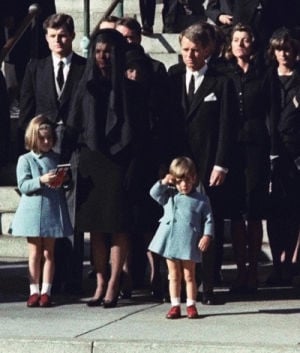GOUVEIA: The day that we lost 'our' president
It was just another November afternoon in Miss Russell's second grade classroom at Norton's L.G. Nourse Elementary School. At a little bit after 1:30 p.m, our thoughts had already turned toward getting home in time to play before it got dark.
Then the crackle of the in-school intercom system broke into our quiet afternoon. We heard the familiar voice of the office secretary, Mrs. Tripp, float from the gray wall speaker and wondered who was getting called to Principal Holbert's office this time.
Then the crackle of the in-school intercom system broke into our quiet afternoon. We heard the familiar voice of the office secretary, Mrs. Tripp, float from the gray wall speaker and wondered who was getting called to Principal Holbert's office this time.
But Mrs. Tripp had a far more serious announcement, one that would change the world around us. We could hear the tremor in her voice as she relayed to us the unthinkable.
"May I have your attention please?" she began as always. "We ask you to please bow your heads on your desks for a moment of silence to pray for President Kennedy, who was shot in the head today in Dallas." There was a long pause, then she said "Thank you," and the speaker once again went silent.
I usually walked home, but that day I ran. I wanted to get to my television and catch up on the latest news. President Kennedy was the only president I had ever known, and was from our state. He was one of us. I remember thinking: "Why would someone shoot him?"
I got home and my younger brother came rushing to the door yelling, "The president is dead. Somebody killed the president!" I shook my head and told him no, he had only been shot. Mrs. Tripp had said nothing about him being dead.
Then I stepped into our television room and saw my mother crying. She looked up at me and nodded slowly, reaffirming my brother's news. "He's dead", she sobbed heavily. "President Kennedy is dead!"
Even though I was only 7, I was deeply affected. Like other Americans, I was glued to the television the next few days as the nation grieved and prepared for uncertainty. I watched with my parents when the alleged assassin, himself, was shot and killed on live television, right there on our Zenith console in stark black and white. I remember wondering just who was in charge of everything now.
I watched the funeral with my maternal grandparents, crying when little John-John Kennedy stepped up and saluted his daddy's coffin. It hit me then that although we had lost our president, he had lost his father.
Looking back a half-century later, it was a defining point in my young existence. It forever connected politics and life for me, and gave me a reason to understand my government and hope to make it better.
President Kennedy was a great leader in our eyes. Here was this man from a wealthy family, dedicating himself to helping poor people and fighting racism.
As kids in Norton, we had little exposure to the latter. Our town was whiter than snow. We didn't hate black kids - we just didn't know any. But they had to be good people because President Kennedy was trying to help them.
My Portuguese and very Catholic paternal grandmother had a huge picture of President Kennedy on the wall of her family room. This was during the days when we celebrated the strengths of our leaders, rather than desperately searching for their every flaw.
I now know President Kennedy was a man with many flaws. His personal life left a lot to be desired. He made many questionable choices.
But he still founded the Peace Corps. He still made a commitment to the space program that led to putting men on the moon. He still laid the groundwork for civil rights legislation that changed a nation.
He was still "our" President, and represented the youthful hopes and dreams of the 1960s.
His example taught a young boy growing up in Norton that you have to give back, and that government should always put people first. His famous words from his inauguration speech stayed with me:
"My fellow Americans, ask not what your country can do for you, ask what you can do for your country."
His death taught us all that time is something to be cherished, not wasted. And that there are few sadder words in the English language than "what might have been "
Bill Gouveia is a local columnist and can be emailed at aninsidelook@aol.com and followed on Twitter at @Billinsidelook.


No comments:
Post a Comment